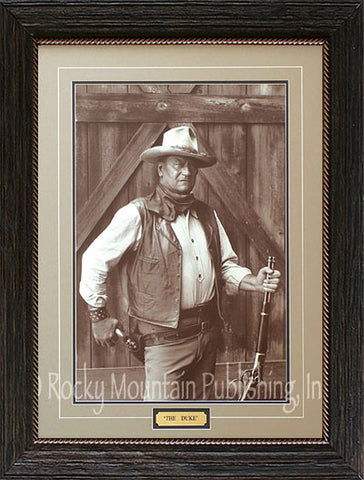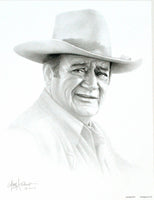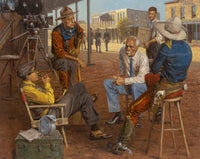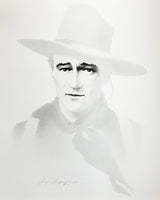John Wayne Art Prints "Home d�cor"
 John Wayne (born Marion Robert Morrison, then renamed Marion Mitchell Morrison; May 26, 1907 – June 11, 1979), also known by his nickname Duke, was an American actor and filmmaker. An Academy Award-winner for True Grit (1969), Wayne was among the top box office draws for three decades.
John Wayne (born Marion Robert Morrison, then renamed Marion Mitchell Morrison; May 26, 1907 – June 11, 1979), also known by his nickname Duke, was an American actor and filmmaker. An Academy Award-winner for True Grit (1969), Wayne was among the top box office draws for three decades.Born in Winterset, Iowa, Wayne grew up in Southern California. He found work at local film studios when he lost his football scholarship to the University of Southern California as a result of a bodysurfing accident. Initially working for the Fox Film Corporation, he appeared mostly in small bit parts. His first leading role came in Raoul Walsh's The Big Trail (1930), which led to leading roles in numerous B movies throughout the 1930s, many of them in the Western genre.
Wayne's career took off in 1939, with John Ford's Stagecoach making him an instant star. He went on to star in 142 pictures. Biographer Ronald Davis said, "John Wayne personified for millions the nation's frontier heritage. Eighty-three of his movies were Westerns, and in them he played cowboys, cavalrymen, and unconquerable loners extracted from the Republic's central creation myth."
Wayne's other well-known Western roles include a cattleman driving his herd north on the Chisholm Trail in Red River (1948), a Civil War veteran whose young niece is abducted by a tribe of Comanches in The Searchers (1956), and a troubled rancher competing with a lawyer for a woman's hand in marriage in The Man Who Shot Liberty Valance (1962). He is also remembered for his roles in The Quiet Man (1952), Rio Bravo (1959), and The Longest Day (1962). In his final screen performance, he starred as an aging gunfighter battling cancer in The Shootist (1976). He appeared with many important Hollywood stars of his era, and his last public appearance was at the Academy Awards ceremony on April 9, 1979
In this Collection!
40's
60's
Actor
American Actor
American Cowboy
Andy Thomas
Art
Art Gallery
art work
Artist
Artwork
Black and White
Buster Keaton
canvas
Canvas Wall Art
Celebrity Portraits
Classic Hollywood
Collector Art
Cowboy
Cowboys
Custom Framed
custom framed art
discount
Discounts
Fine Art
FREE collectors club
free shipping
Fremont Street Tombstone
Gallery4Collectors
Gary Cooper
Gary Saderup
Giclee Canvas
Giclee Canvas Art Print
Giclee Canvas Prints
Giclee on Canvas - canvas
Gun
History
History Art
History Picture
Hollywood
Hollywood Actors
Hollywood Cowboys
home canvas wall art
Home Decor
Home D‚cor
In Costume
investment art
John Ford
John Wayne
Limited Edition Prints
lithograph
Living Room Artwork
Look Who's Here
made in the usa
Movie set
No Sales Tax
Nostalgic
Nostalgic Art
Nostalgic Artwork
office art
office decor
Online Gallery
Online Gallery of Art
paintings
Paper Art Prints
Paper Lithograph
Paper Prints
pics
Portrait
poster
print
prints
reproduction
Rifle
Saloon
Sepia Tone
Soldiers
Stagecoach
The Duke
Tom Mix
True Grit Movie
Wall Art
Western
Western Actors
Western Art
Western Art Prints
Western Artwork
Western Movies
Westerns
William S Hart
Wyat Earp





